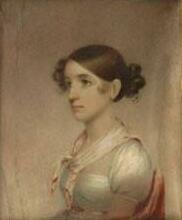Washington Irving
Washington Irving (April 3, 1783 – November 28, 1859) was an American short story writer, essayist, biographer, historian, and diplomat of the early 19th century. He is best known for his short stories "The Legend of Sleepy Hollow" and "Rip Van Winkle," both of which appear in his collection The Sketch Book of Geoffrey Crayon, Gent. His historical works include biographies of George Washington, Oliver Goldsmith and Muhammad, and several histories of 15th-century Spain dealing with subjects such as Christopher Columbus and the Moors.
Irving served as the U.S. ambassador to Spain from 1842 to 1846. He made his literary debut in 1802 with a series of observational letters to the Morning Chronicle, written under the pseudonym Jonathan Oldstyle. He was a part of the New York literary circle that included James Fenimore Cooper and William Cullen Bryant. Irving's literary works often combined satire, historical fiction, and accounts of colonial American life.
Early Life[edit | edit source]
Washington Irving was born in New York City in 1783. He was named after George Washington, whom his parents admired greatly. Irving's family was wealthy, which allowed him to pursue his education and later, his interests in writing and traveling. Despite initially studying law, Irving's passion for writing soon became his primary focus.
Literary Career[edit | edit source]
Irving's first major success came with the publication of The Sketch Book of Geoffrey Crayon, Gent. (1819-1820), which included his most famous stories, "The Legend of Sleepy Hollow" and "Rip Van Winkle." These stories, set in the American countryside, captured the imagination of the public and critics alike. Irving's use of American landscapes, folklore, and history was pioneering in the creation of a distinctly American literary voice.
Following the success of The Sketch Book, Irving continued to write prolifically. His works such as Bracebridge Hall (1822), Tales of a Traveller (1824), and The Alhambra (1832) further cemented his reputation as a leading author of his time. Irving's historical biographies, including A History of the Life and Voyages of Christopher Columbus (1828), were also well-received, showcasing his meticulous research and storytelling skills.
Later Life and Legacy[edit | edit source]
In his later years, Irving focused on historical works and biographies. His five-volume biography of George Washington took years of research and was completed just months before Irving's death in 1859. Washington Irving died at his estate, Sunnyside, in Tarrytown, New York. He left behind a legacy as a foundational figure in American literature, whose works have inspired countless readers and writers.
Irving's influence extends beyond literature; his stories have been adapted into plays, movies, and cartoons, making characters like Ichabod Crane and Rip Van Winkle familiar to generations of readers and viewers. His contributions to the development of the American short story and his innovative use of folklore and historical material in his works remain significant in the study of American literature.
See Also[edit | edit source]
This article is a literature-related stub. You can help WikiMD by expanding it!
Search WikiMD
Ad.Tired of being Overweight? Try W8MD's physician weight loss program.
Semaglutide (Ozempic / Wegovy and Tirzepatide (Mounjaro / Zepbound) available.
Advertise on WikiMD
|
WikiMD's Wellness Encyclopedia |
| Let Food Be Thy Medicine Medicine Thy Food - Hippocrates |
Translate this page: - East Asian
中文,
日本,
한국어,
South Asian
हिन्दी,
தமிழ்,
తెలుగు,
Urdu,
ಕನ್ನಡ,
Southeast Asian
Indonesian,
Vietnamese,
Thai,
မြန်မာဘာသာ,
বাংলা
European
español,
Deutsch,
français,
Greek,
português do Brasil,
polski,
română,
русский,
Nederlands,
norsk,
svenska,
suomi,
Italian
Middle Eastern & African
عربى,
Turkish,
Persian,
Hebrew,
Afrikaans,
isiZulu,
Kiswahili,
Other
Bulgarian,
Hungarian,
Czech,
Swedish,
മലയാളം,
मराठी,
ਪੰਜਾਬੀ,
ગુજરાતી,
Portuguese,
Ukrainian
Medical Disclaimer: WikiMD is not a substitute for professional medical advice. The information on WikiMD is provided as an information resource only, may be incorrect, outdated or misleading, and is not to be used or relied on for any diagnostic or treatment purposes. Please consult your health care provider before making any healthcare decisions or for guidance about a specific medical condition. WikiMD expressly disclaims responsibility, and shall have no liability, for any damages, loss, injury, or liability whatsoever suffered as a result of your reliance on the information contained in this site. By visiting this site you agree to the foregoing terms and conditions, which may from time to time be changed or supplemented by WikiMD. If you do not agree to the foregoing terms and conditions, you should not enter or use this site. See full disclaimer.
Credits:Most images are courtesy of Wikimedia commons, and templates, categories Wikipedia, licensed under CC BY SA or similar.
Contributors: Prab R. Tumpati, MD






